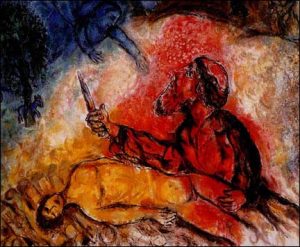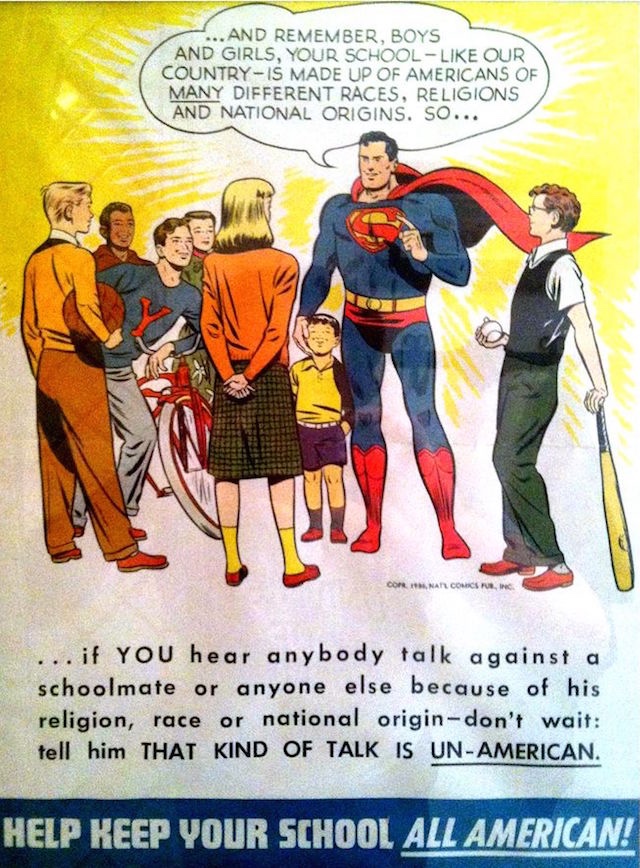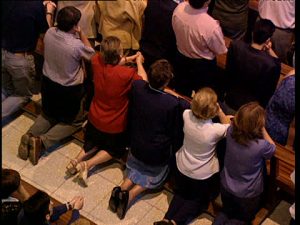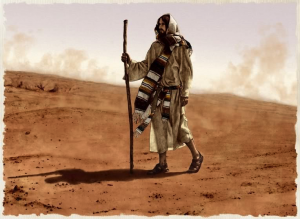====================
A homily offered by the Rev. Dr. C. Eric Funston on the Fourth Sunday after Pentecost, July 2, 2017, to the people of St. Paul’s Episcopal Church, Medina, Ohio, where Fr. Funston is rector.
(The lessons for the service are from Proper 8A (Track 1) of the Revised Common Lectionary: Genesis 22:1-14; Psalm 13; Romans 6:12-23; and St. Matthew 10:40-42. These lessons can be read at The Lectionary Page.)
====================
 The great Anglican preacher Herbert O’Driscoll begins his reflections on our Old Testament lesson, the story of the testing of Abraham and the binding of Isaac, truthfully the near-murder of Isaac, with these words:
The great Anglican preacher Herbert O’Driscoll begins his reflections on our Old Testament lesson, the story of the testing of Abraham and the binding of Isaac, truthfully the near-murder of Isaac, with these words:
No one approaches this passage without feeling the great weight of it. It exudes darkness and mystery, and it brings before us a thousand questions, most of which have no answers. (The Word Among Us: Year A, Volume 3, Anglican Book Centre, Toronto:1999, pg 35)
In the late 1300s an unknown English author penned a short treatise entitled The Cloud of Unknowing basically arguing that “darkness and mystery,” those thousands of unanswerable questions, are really fundamental the nature of our relationship with God. (Our opening prayer at each Eucharist, the so-called Collect for Purity, is the opening prayer of The Cloud of Unknowing.) The book takes the form, in part, of a conversation between student and master. The student asks how one can think about God, and the master replies that a human being cannot actually do this:
[O]f all other creatures and their works, yea, and of the works of God’s self, may a man through grace have fullhead of knowing, and well he can think of them: but of God Himself can no man think. And therefore I would leave all that thing that I can think, and choose to my love that thing that I cannot think. For why; He may well be loved, but not thought. By love may He be gotten and holden; but by thought never. And therefore, although it be good sometime to think of the kindness and the worthiness of God in special, and although it be a light and a part of contemplation: nevertheless yet in this work it shall be cast down and covered with a cloud of forgetting. And thou shalt step above it stalwartly, but Mistily, with a devout and a pleasing stirring of love, and try for to pierce that darkness above thee. And smite upon that thick cloud of unknowing with a sharp dart of longing love . . . . “ (The Cloud of Unknowing, Evelyn Underhill, tr., PDF available at CCEL, pg 31)
The Spanish mystical poet, St. John of the Cross, made a similar point in his poem which he did not title but which has come to be called The Dark Night of the Soul. The first verse, as translated by A.Z. Foreman, a linguist at the University of Chicago, is this:
Once in the dark of night,
Inflamed with love and yearning, I arose
(O coming of delight!)
And went, as no one knows,
When all my house lay long in deep repose
(Poems in Found Translation)
St. John of the Cross, who published his poem with a couple of expository essays, said of the first stanza:
In this first stanza the soul relates the way and manner which it followed in going forth, as to its affection, from itself and from all things, and in dying to them all and to itself, by means of true mortification, in order to attain to living the sweet and delectable life of love with God; and it says that this going forth from itself and from all things was a ‘dark night,’ by which . . . is here understood purgative contemplation, which causes passively in the soul the negation of itself and of all things referred to above.
And this going forth it says here that it was able to accomplish in the strength and ardour which love for its Spouse gave to it for that purpose in the dark contemplation aforementioned. Herein it extols the great happiness which it found in journeying to God through this night with such signal success that none of the three enemies, which are world, devil and flesh, . . . could hinder it; inasmuch as the aforementioned night of purgative contemplation lulled to sleep and mortified, in the house of its sensuality, all the passions and desires with respect to their mischievous desires and motions. (St. John of the Cross, The Dark Night of the Soul, E. Allison Peers, tr., PDF available at CCEL, pg 16)
In contemplating this bizarre story of Abraham almost sacrificing his son, we are forced to approach God with the same sense that the unknown author of The Cloud of Unknowing and St. John of the Cross. We must read this and take it in through our love of God because we cannot make sense of this intellectually; if we try, we may end up not loving God because this God who seems to demand human sacrifice is not lovable.
Better folk than I have tried to make sense of this over the many centuries, the millennia since the story made its way into the foundational religious literature of Judaism and Christianity. Let me tell you about some of their attempts.
Although tradition says that Moses wrote the Pentateuch (the first five books of the Old Testament), biblical scholars identified four “sources” or schools of authors for it. The earliest source is called the “Yahwist” because this writer (there may be more than one, but I’ll refer to each source as a single person just for ease of expression) habitually refers to God by that name; it is believed that the Yahwist was associated with Jerusalem during the united kingdom of Israel sometime before the year 950 BCE. The second source is called the “Elohist;” he won’t use God’s Name but substitutes the word “Elohim” (meaning “Lord God”). The Elohist is next historically, believed to be associated with the norther kingdom around the year 850 BCE. The third source is the “Deuteronomist,” so called because he is the author of Deuteronomy and some of the historical texts outside of the Pentateuch. The Deuteronomist is believed to have written during the reign of Josiah in the southern kingdom of Judah around the year 625 BCE. The last is the “Priestly” source, sometimes called the “Redactor.” He is believed to have taken the other three, edited them together and additional material of his own, about the year 500 BCE shortly after the Babylonian Exile.
I tell you all that because one of the ways scholars have tried to make sense of this story of Abraham and Isaac is to argue that it’s a mash-up, that the Redactor has taken an early Yawhist story, mixed it up with some bits from the Elohist, and added some bits of his own to create a story which emphasizes the obedience and submission of Abraham at the expense of the story’s depiction of the Almighty. The emphasis is on Abraham’s trust, not on God’s demand. “Abraham does not simply obey; he obeys because he trusts. He could have obeyed because he was ordered to do so; if God commands, he had better respond. But [the text] makes clear that he obeys because he trusts God, that God will be faithful and will act in his best interests.” (Terence E. Fretheim, Commentary on Genesis, The New Interpreters Bible: Volume 1, Abingdon Press, Nashville:1994, pg 499).
Another way faithful people have sought to make sense of the story is by adding to it themselves. In the rabbinic tradition there is the practice of authoring what are called midrashim. This is a genre of rabbinic literature which seeks to flesh out the characters of the Bible. The midrashic authors often sought to provide a sort of back story for the biblical characters. The sages invented these stories to explain the motivations of God and human characters, imagining their inner lives. Midrashim take roughly sketched biblical characters and fill in the blanks, making the biblical sketches into human figures with whom we can more easily identify. Some of the most famous midrashim have become so imbedded in the tradition that many people do not even realize they aren’t found in the Bible. (The pious legends of Joseph, Mary, and other saints are a similar sort literature.)
The opening words of today’s text, “After these things,” apparently can be understood in the Hebrew as meaning “after these words,” so the midrashic rabbis, wondering what that might mean developed some explanatory scenarios. One midrash on this text suggests that God and Satan had a bet about Abraham much like their wager about Job, i.e., will the righteous man, Abraham, kill his son when asked? Another imagines Isaac and Ishmael, Abraham’s older son born to Hagar the slave woman, arguing about whose circumcision is “better” – Ishmael’s because was done when he was a teenager and therefore able to refuse, or Isaac’s completed when he was an infant only eight days old. Isaac says he is willing to sacrifice every member of his body to God, and God thus tests Isaac through his order to Abraham. Another midrashic gloss on the story tells us that Isaac at the time of this incident was 37 years old and a willing participant in his near-sacrifice, not an innocent and unsuspecting child. Changing or trying to understand the story through editing, revision, and addition is a venerable tradition.
But the story pretty much stands “as is” in our biblical canon and although it is fun to imagine these back-stories, when we rely on them we don’t rely on Scripture. We rely, instead, on our own imaginations. The text remains stark and troubling, dark and unfathomable.
The 19th Century Danish Theologian Søren Kierkegaard in looking at this story called Abraham a “knight of faith.” A knight of faith is a person willing to make a move of resignation in which demonstrable love of God predominates over worldly happiness. The knight of faith does this in solitude, as Abraham does. Despite the fact that he loves his son, Abraham’s love of God is greater, so he resigns himself to giving up Isaac at God’s command, and he moves to do so without discussing his actions with Sarah or with anyone else. This is what Kierkegaard calls the “teleological suspension of the ethical.” Seventh-Day Adventist writer Jason Hines describes it this way:
When God asks us to do something that defies social convention or that seems out of the ordinary, if we decide to do it, it seems that we feel the need to justify our decisions to others. It is a human trait – we don’t want to seem crazy for doing whatever thing God just led us to do. However, the knight of faith realizes that the walk of faith is not always a group activity. Therefore there is no need to justify the action.” (Jason Hines, The Knight of Faith, Spectrum Magazine, April 25, 2013, online)
For the knight of faith, the ultimate deciding factor is not the ethical norm, but his individual relationship to God. To fulfill the telos – God’s ultimate purpose – Abraham’s faith in God is called upon to set aside normal canons of ethics and humanity. Here, the knight of faith encounters the dark night of the soul: Abraham, in John of the Cross’s words, “in order to attain to living the . . . life of love with God” must “go forth” from himself “and from all things,” including not only his beloved son, but also the ethical norms his community. One cannot do this intellectually; as the author of The Cloud of Unknowing put it, God “may well be loved, but not thought. By love may [God] be gotten and [held]; but by thought never.”
Herbert O’Driscoll, in his commentary on today’s lessons, noted that he could find little, if any, connection between this seemingly monstrous Old Testament tale of Abraham nearly killing his child and the gospel lesson, and on the surface he is right. But our gospel lesson today is the tale end of Jesus commissioning his apostles, which began in last week’s gospel reading with his telling them
Do not think that I have come to bring peace to the earth; I have not come to bring peace, but a sword.
For I have come to set a man against his father,
and a daughter against her mother,
and a daughter-in-law against her mother-in-law;
and one’s foes will be members of one’s own household.Whoever loves father or mother more than me is not worthy of me; and whoever loves son or daughter more than me is not worthy of me; and whoever does not take up the cross and follow me is not worthy of me. Those who find their life will lose it, and those who lose their life for my sake will find it.” (Matt 10:34-39)
Now he tells them that there are others, outside their families but within the community of disciples, who will welcome and reward them. “The integral relationships between the disciples, Jesus, and God replace the disciples’ broken relationships with family and society. . . . [T]he call of discipleship does not fit very happily with ‘traditional family values,’ whether ancient or modern. The vocation of disciples necessarily relativizes all other relations and obligations – whether to party, corporation, or family – in favor of the new family that is the community of disciples.” (Stanley Saunders, Commentary on Matthew 10:40-42, Working Preacher, online)
The story of Abraham and Isaac, of course, is not history, it is metaphor. It is not meant to teach us about the characters in the story; it is meant to teach us about ourselves. As metaphor, I suggest to you that it represents the counter-cultural nature of Christian faith and action revealed in Jesus words in last week’s and this week’s gospel lessons. Just as Abraham had to turn away from and reject the ethical norms of his society to follow the command of God, so must the disciple of Christ be prepared to deny the cultural norms of his or her society. Again, as John of the Cross said, “in journeying to God” we must not allow ourselves to be hindered by “the three enemies, which are world, devil and flesh,” any more than Abraham was hindered by the ethical norms of his culture.
As Christians called “to restore all people to unity with God and each other in Christ” (Catechism, BCP 1979, pg 855) we are to be salt, preserving agents actively working for that restoration in the midst of and rejecting a culture many perceive as decadent and decaying. We are to cooperate with Christ’s redeeming power working through us in ways that may contradict cultural norms and often flow counter to the cultural tide.
A commitment to being countercultural . . . isn’t always easy. Living differently can be hard. Going against the ebbs and flows of culture can create friction and sometimes provoke a hostile reaction to the good we are trying to create. Theologians Stanley Hauerwas and Will Willimon remind us that this should be expected, for “whenever a people are bound together in loyalty to a story that includes something as strange as the Sermon on the Mount, we are put at odds with the world.” (Gabe Lyons, What Does Being Countercultural Look Like?, Q Ideas, online; quoting Resident Aliens: A Provocative Christian Assessment of Culture and Ministry for People Who Know that Something is Wrong, Abingdon Press, Nashville:1989, pg 94)
The story of the binding of Isaac and the gospel story of Jesus’ commissioning of the apostles are both stories with what O’Driscoll called “great weight.” They exude a darkness and mystery that raise a thousand unanswerable questions; they call us to an alternative way of seeing our world, to protest and stand against what is wrong, to cry out against injustice, and to call for an end to corruption. They call us to stand for something better, to stand for the “restor[ation] all people to unity with God and each other in Christ,” to stand for “the sweet and delectable life of love with God.”
(Note: The illustration is “Le Sacrifice d’Isaac” by Marc Chagall (1887-1985). It hangs in the Musée National Marc Chagall, Nice, France)
====================
Father Funston is the rector of St. Paul’s Episcopal Church, Medina, Ohio.
 It’s the Fourth Sunday of Easter and that means it’s “Good Shepherd Sunday.” And that means that clergy throughout the church have, for the last week, been scratching their heads thinking, “This again? What can I do this time with the sheep-and-shepherd simile?” But, I’m not among them. For three days this past week, the clergy of this diocese have been in conference with our bishop, with a retired seminary president, and with a retired cathedral dean exploring exactly what we understand our ordinations to the diaconate and to the presbyterate to mean. That has kind of taken my attention off the “Good Shepherd” metaphor.
It’s the Fourth Sunday of Easter and that means it’s “Good Shepherd Sunday.” And that means that clergy throughout the church have, for the last week, been scratching their heads thinking, “This again? What can I do this time with the sheep-and-shepherd simile?” But, I’m not among them. For three days this past week, the clergy of this diocese have been in conference with our bishop, with a retired seminary president, and with a retired cathedral dean exploring exactly what we understand our ordinations to the diaconate and to the presbyterate to mean. That has kind of taken my attention off the “Good Shepherd” metaphor. Have you ever had the experience of a long-forgotten memory rushing back upon you and just knocking you for a loop? Something like an odor or a song or a picture brings it back and the details hit you like a sledge hammer. That happened to me on Monday evening.
Have you ever had the experience of a long-forgotten memory rushing back upon you and just knocking you for a loop? Something like an odor or a song or a picture brings it back and the details hit you like a sledge hammer. That happened to me on Monday evening.  In a New York Times editorial, Frank Bruni said:
In a New York Times editorial, Frank Bruni said: May God be merciful to us and bless us, show us the light of his countenance and come to us. (Ps. 67:1) Amen.
May God be merciful to us and bless us, show us the light of his countenance and come to us. (Ps. 67:1) Amen. “The Lord called me before I was born, while I was in my mother’s womb he named me.” (Isa. 49:1b) What a powerful statement that is that the prophet makes in today’s reading. We name this prophet Isaiah; scholars name him Deutero-Isaiah or Second Isaiah. We don’t really know his name . . . but God did! God named him before he was born. Gave him personhood and human identity.
“The Lord called me before I was born, while I was in my mother’s womb he named me.” (Isa. 49:1b) What a powerful statement that is that the prophet makes in today’s reading. We name this prophet Isaiah; scholars name him Deutero-Isaiah or Second Isaiah. We don’t really know his name . . . but God did! God named him before he was born. Gave him personhood and human identity. A few years ago I read an essay about the trials and tribulations of relocation, particularly from region to region within our country. In it the author made the comment that when relocating to the South, there were two invariably asked questions of the newcomer: “Who are your people?” and “Where do you go to church?” These, he said, are quintessentially Southern inquiries which serve to position the interrogated in a place’s social network and milieu. The assumptions, of course, are that no one would relocate to a town where they did not have “people” (i.e., family members) and that everyone goes to church somewhere.
A few years ago I read an essay about the trials and tribulations of relocation, particularly from region to region within our country. In it the author made the comment that when relocating to the South, there were two invariably asked questions of the newcomer: “Who are your people?” and “Where do you go to church?” These, he said, are quintessentially Southern inquiries which serve to position the interrogated in a place’s social network and milieu. The assumptions, of course, are that no one would relocate to a town where they did not have “people” (i.e., family members) and that everyone goes to church somewhere.  It’s the last Sunday of the Christian year, sort of a New Year’s Eve for the church. We call it “the Feast of Christ the King” and we celebrate it by remembering his enthronement. As Pope Francis reminded the faithful in his Palm Sunday homily a few years ago, “It is precisely here that his kingship shines forth in godly fashion: his royal throne is the wood of the Cross!” (
It’s the last Sunday of the Christian year, sort of a New Year’s Eve for the church. We call it “the Feast of Christ the King” and we celebrate it by remembering his enthronement. As Pope Francis reminded the faithful in his Palm Sunday homily a few years ago, “It is precisely here that his kingship shines forth in godly fashion: his royal throne is the wood of the Cross!” ( On the day after the general election, a Presbyterian clergyman in Iowa, a married gay man, found a computer-printed note tucked under his car’s windshield wiper addressed to “Father Homo.” The text of the note began with the question “How does it feel to have Trump as your president?” and was both belittling and threatening. The same day a softball dugout in Island Park in Wellsville, New York, was defaced with graffiti reading “Make America White Again,” accompanied by a large swastika. The next day, students at nearby Canisius College, a Jesuit institution, found a black baby doll with a noose tied around its neck in the freshman dormitory elevator, and students at Wellesley College in Massachusetts witnessed two young white men drive a truck through their campus flying a Trump campaign banner, yelling “Make American Great Again,” and spitting on African-American young women.
On the day after the general election, a Presbyterian clergyman in Iowa, a married gay man, found a computer-printed note tucked under his car’s windshield wiper addressed to “Father Homo.” The text of the note began with the question “How does it feel to have Trump as your president?” and was both belittling and threatening. The same day a softball dugout in Island Park in Wellsville, New York, was defaced with graffiti reading “Make America White Again,” accompanied by a large swastika. The next day, students at nearby Canisius College, a Jesuit institution, found a black baby doll with a noose tied around its neck in the freshman dormitory elevator, and students at Wellesley College in Massachusetts witnessed two young white men drive a truck through their campus flying a Trump campaign banner, yelling “Make American Great Again,” and spitting on African-American young women.

